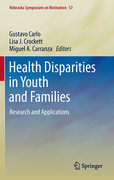
Health disparities in youth and families: research and applications
Carlo, Gustavo
Crockett, Lisa J.
Carranza, Miguel A.
Amid its growing diversity and shifting demographics, the U.S. is still home to glaring health inequities by race, ethnicity, and class. Yet while it is customary to identify poverty as their root cause, other complex mechanisms are involved in their perpetuation. Based on recent major studies on African-American, Latino, Asian-American, and Native American populations, Health Disparities in Youth and Families offers a thorough, nuanced examination of a wide range of causal—and protective—factors. Rigorous theories and models take into account cultural, contextual, and personal variables, including the roles of family identity, school, and neighborhood, and motivation toward health awareness (with attention paid to less frequently studied phenomena such as within-groupinequalities and the Hispanic Health Paradox). Contributors approach their subjects with realism as well as optimism as the book: povides reliable information on the scope and etiology of health disparities, identifies the methodological and political challenges associated with this issue, proposes comprehensive, integrative models for understanding disparities, features examples of innovative programs for improving minority health, includes an in-depth chapter on substance use and mental health among Native American youth, offers a usefulstarting point for the exchange of ideas necessary to address health disparities. A provocative resource on a pressing social concern, Health Disparities in Youth and Families is necessary reading for health policy researchers, health care providers, and others dedicated to better health outcomes for all Americans. Provides basic information on the scope and etiology of health disparities - Identifies the methodological and political challenges involved with Thisissue - Provides a starting point for exchange of ideas to address these challenges and reduce these disparities INDICE: How Money Matters for Children’s Socioemotional Adjustment: FamilyProcesses and Parental Investment.- The Self-Regulation of Health Relevant Behaviors: The Role of Conscious Awareness and Motivation.- Risk and Resilience during Early Adolescence: What it means for African American and Latino Families.- Social Identity, Motivation, and Well Being among Adolescents from Asian and Latin American Backgrounds.- Health Disparities, Social Inequality and theHuman Genome.- School Ethnic Diversity and Disparities in Mental Health Outcomes.- Social and Historical Risk and Protective Factors Affecting Substance Use and Mental Health among Indigenous Adolescents.- Lessons Learned: Integrative Approaches to Policies and Programs.
- ISBN: 978-1-4419-7091-6
- Editorial: Springer
- Encuadernacion: Cartoné
- Páginas: 200
- Fecha Publicación: 29/10/2010
- Nº Volúmenes: 1
- Idioma: Inglés
